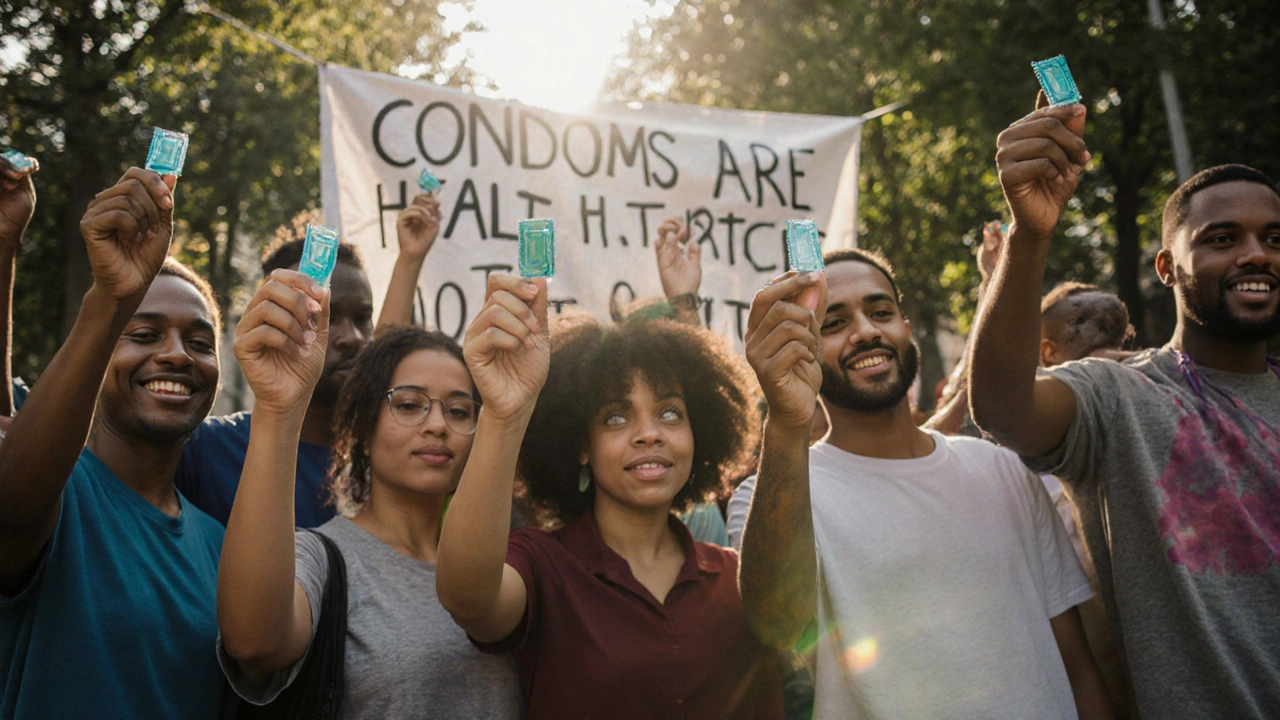Carrying a condom shouldn’t be a crime. But in many places around the world, it is. Police have used possession of condoms as evidence to arrest, detain, or prosecute people engaged in sex work. This isn’t just a legal technicality-it’s a public health crisis. When people fear being arrested for having a condom, they don’t carry them. That leads to more HIV, hepatitis, and STIs. And it’s happening right now in dozens of countries.
Condoms as Evidence: The Real-World Impact
In 2012, Human Rights Watch documented cases in New York City where police confiscated condoms from sex workers during arrests. One woman was told, ‘If you were really protecting yourself, you wouldn’t be doing this.’ In Kenya, a 2014 study found that 58% of female sex workers reported being arrested or threatened with arrest for carrying condoms. In South Africa, transgender women were routinely detained under laws that treated condoms as proof of ‘intent to engage in prostitution.’
These aren’t isolated incidents. They’re systemic. In places where sex work is criminalized-even partially-condoms become legal weapons. Officers don’t need to see a transaction. They don’t need to prove a sale happened. Just having a condom in your pocket, purse, or pocketbook is enough to trigger detention, fines, or even jail time.
Where It’s Illegal to Have a Condom
The laws vary wildly. In the United States, the rules depend on the state and even the city. In 2014, California passed a law explicitly banning the use of condoms as evidence in prostitution cases. New York followed in 2017. But in Texas, Florida, and parts of the Midwest, police still use condom possession as probable cause for arrest. In some rural counties, officers keep confiscated condoms as evidence in court files.
Outside the U.S., the picture is worse. In Russia, possession of condoms can be used to support charges under anti-prostitution statutes. In parts of Eastern Europe and Central Asia, NGOs report that sex workers are pressured to hand over condoms during raids. In the Philippines, police have arrested people for ‘obscenity’ simply for carrying multiple condoms.
Even in countries where sex work is legal-like Germany or the Netherlands-some local ordinances still allow police to use condom possession as a reason to question or harass sex workers. It’s not about safety. It’s about control.
Why This Matters for Public Health
When people avoid carrying condoms because they fear arrest, infection rates rise. The World Health Organization found that in areas where condoms are criminalized, HIV prevalence among sex workers is up to 30% higher than in areas where condom access is protected. In countries like Zimbabwe and Ukraine, HIV transmission among sex workers dropped by nearly half after laws were changed to stop using condoms as evidence.
It’s not just about sex workers. Clients, partners, and entire communities are affected. One condom in a pocket can prevent a chain reaction of infections. But when fear replaces protection, the cost isn’t measured in arrests-it’s measured in lives.
How Laws Are Changing (Slowly)
Change is happening, but it’s uneven. In 2020, the United Nations issued guidance stating that criminalizing condom possession violates human rights and public health standards. That same year, Canada’s Supreme Court ruled that using condoms as evidence in sex work cases was unconstitutional. In 2023, Portugal decriminalized all forms of sex work and passed a law explicitly protecting condom possession as a health measure.
In Australia, laws vary by state. In New South Wales and Victoria, sex work is decriminalized. Police there are trained not to use condom possession as evidence. In Queensland and Western Australia, sex work is legal under licensing rules, and condom possession is not considered proof of illegal activity. But in places like South Australia, where only brothel-based work is legal, independent sex workers still face risks.
The key shift? Moving from punishment to protection. When laws treat condoms as tools of safety-not proof of crime-public health improves. Cities that adopted this approach, like San Francisco and Berlin, saw drops in STI rates within two years.

What You Need to Know If You’re in a High-Risk Area
If you’re a sex worker, or work with sex workers, here’s what you need to know:
- In the U.S., check your state’s laws. California, New York, Illinois, and Rhode Island have explicit protections. In others, it’s still risky.
- In Latin America, countries like Argentina and Colombia have moved toward decriminalization, but local police may still act illegally. Document any harassment.
- In Southeast Asia, countries like Thailand and Cambodia have inconsistent enforcement. Even where sex work is tolerated, condoms can still be used against you.
- In Europe, legal status matters. In Germany and the Netherlands, condom possession is protected. In France and Italy, it’s a gray zone-police can still use it as a pretext.
- Always carry condoms in their original packaging. Some jurisdictions claim ‘bulk’ or ‘reused’ condoms indicate commercial activity.
Know your rights. In many places, you don’t have to consent to a search. You don’t have to hand over your belongings. If you’re arrested, ask for legal counsel immediately. Organizations like the Global Network of Sex Work Projects can connect you with local support.
The Bigger Picture: Law vs. Reality
The idea that condoms equal crime is rooted in stigma, not science. It’s based on the false belief that sex work is inherently immoral or dangerous. But the data doesn’t lie: criminalizing condoms increases harm. Legalizing and protecting them reduces harm.
Real progress comes when laws reflect reality. When police are trained to see condoms as life-saving tools, not evidence. When courts refuse to accept them as proof of illegal activity. When public health agencies work with sex workers-not against them.
Until then, the most basic act of protection-using a condom-remains a legal gamble. And the cost is paid in infections, arrests, and lives lost.
Can police legally use condoms as evidence of sex work?
In many places, yes-until recently. But laws are changing. In California, New York, Canada, Portugal, and parts of Australia, using condoms as evidence is now illegal or explicitly banned. In other jurisdictions, it’s still common practice. The legality depends entirely on local laws, and enforcement can be inconsistent even within the same country.
Which countries have banned using condoms as evidence?
As of 2025, countries with explicit legal protections include the United States (California, New York, Illinois, Rhode Island), Canada, Portugal, Germany, the Netherlands, and Australia (NSW, Victoria, and ACT). These jurisdictions either decriminalized sex work or passed specific laws prohibiting the use of condoms as proof of illegal activity. Many others have no such protections.
Does having a condom mean I’m automatically breaking the law?
No. In any jurisdiction where sex work is legal or decriminalized, possessing a condom is not a crime. Even where it’s illegal, possession alone is not proof of a transaction. However, in places where enforcement is biased or corrupt, police may still use it as a pretext for arrest. Knowing your local laws and carrying condoms in original packaging can help reduce risk.
What should I do if police confiscate my condoms?
If your condoms are taken, ask for a receipt or written explanation. Record the officer’s badge number and name if possible. Contact a local sex worker rights organization immediately. In many places, this is a violation of human rights and public health policy. Legal aid groups can help file complaints or challenge the seizure. Never hand over condoms willingly if you believe it could be used against you.
Are there safe ways to carry condoms to avoid arrest?
Yes. Carry condoms in their original, unopened packaging. Avoid large quantities unless you’re in a legal or decriminalized zone. Store them in a separate, non-suspicious item like a makeup bag or wallet. In high-risk areas, some sex workers keep condoms hidden in everyday items like hair clips or phone cases. But the safest strategy is knowing your local laws and connecting with advocacy groups who can advise on legal protections.
